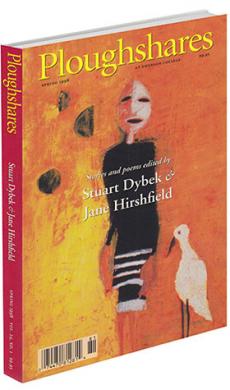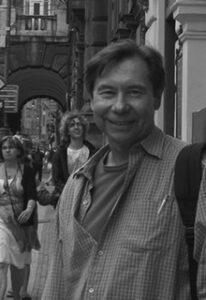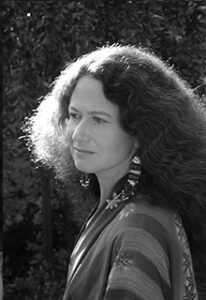rev. of Dark Sky Question by Larissa Szporluk
Dark Sky Question
Poems by Larissa Szporluk. Beacon Press, $12.00 paper. Reviewed by Susan Conley.
In Larissa Szporluk’s startling first collection of poems,
Dark Sky Question, winner of the 1997 Barnard New Women Poets Prize, one finds a fiercely independent voice mapping the geography of longing. Here the backdrop of a darkening sky is just one small mystery in an entire universe that poses itself as unknowable: “a warm place at the end / / of a grove of horned trees . . .” (“Krell”). The book unfolds as a search to uncover answers, yet nothing is conventional or linear about Szporluk’s investigation.
Szporluk probes the realm of religion, but not the religion of prayer and salvation to which we have become accustomed. It is a much more irrational notion of God she writes about, with bold, open-hearted intensity. There is a kind of monasticism at work, an austerity to the brilliant descriptions, but also a deep willingness to plumb the depths. The language is subtle; it doesn’t once raise its voice, issuing instead quiet, solemn directives: “leave if you’re leaving. Leave plain mud.”
Szporluk weaves a subversive undertone between the lines which disrupts any notion of traditional autobiography. We find a fierce self-examination here, but without much of the narcissism inherent in a great deal of American poetry. In her poems, we see traces of the tight, experimental, interior tradition of Emily Dickinson or Lorraine Niedecker, or perhaps Fanny Howe: “I don’t pray. / I just walk out there / where it’s thin / with my bow and aim.” She creates a whole new lexicon with which to speak of absence and desire, and language for her is more significant than that which it signifies: “A man says ‘the best thing here is the moon,’ he feels happier than if he’d seen it.” Yet Szporluk also understands how consistently language will let us down, how it will lie, how language will even fail God: “He arrives and looks around, and doesn’t know the word for wind, and wind is the subject . . .” (“Krell”).
The poems here are quirky, rigorous, and demanding. The line breaks and stanzas move quickly and decisively. They sustain themselves on their own edginess and originality rather than plot or narrative, and challenge the reader within their tight confines: “There was no moon, only space / in the waves, like a vow unmade, / or a cage whose interior flew . . .” (“Secrets of Jove”).
The speaker of many of these poems, grappling with marriage and motherhood, is deeply wary of domestication, of obscuring her vision by way of routine. In “Occupant of the House,” the voice is cool and clinical and slightly resentful: “Like a pure wild race / captured for science, too wronged / to go back, too strange to be damaged, / my fierceness has disappeared. / If it doesn’t end soon, the pain will dilute, / the sin turn to sheen in the garden, / your routine a genial rain . . . / I wouldn’t know about my body . . .”
These poems don’t pretend to believe in redemption, yet at times they are nostalgic for the old order: “why can’t eternity be where they were, back in the chain, the pull for the worm, scrape with the carnivore, the feeling of constant attraction forever . . .” (“Biology of Heaven”). Szporluk demands more than “this airy regularity. / Not this luminous branchlessness. / There is nothing to study. / The anxiety reaches a pitch . . . / One lone voice chokes on its obstinance — /
I’m human, I’m human, I know that I know.”
Dark Sky Question is enormously successful poetry for an unpredictable universe. Szporluk has written poems that cleave to language and reinvent the workings of the mind, but most importantly, poems that are also fiercely attached to the workings of the heart.


